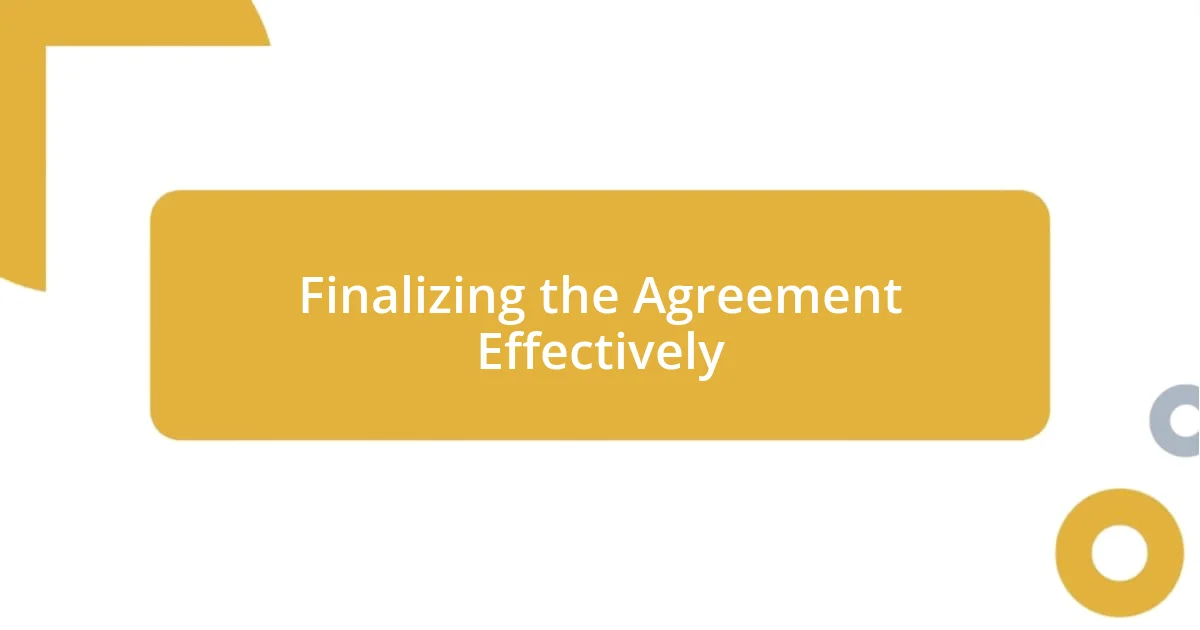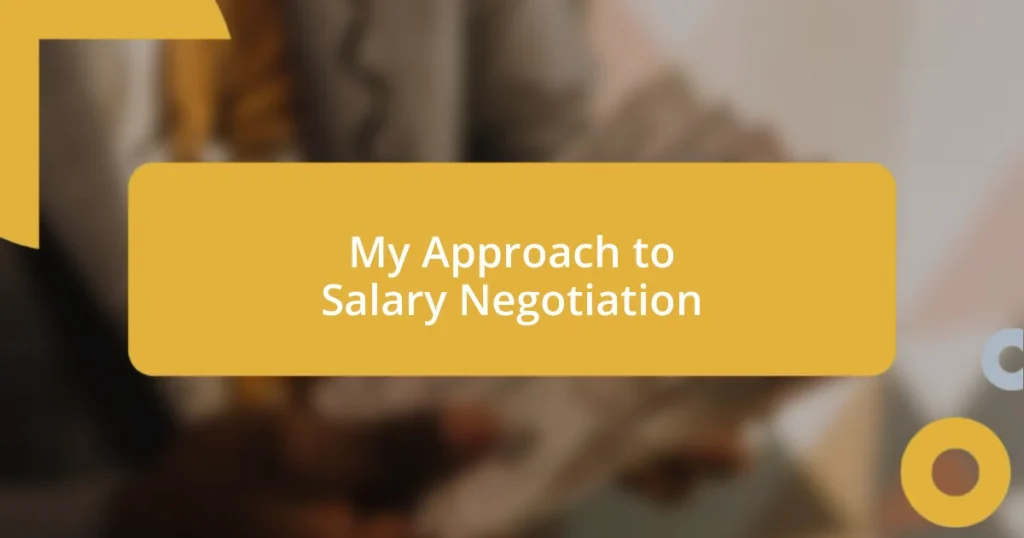Key takeaways:
- Research industry salary standards and prepare a detailed salary range to boost confidence during negotiations.
- Create a compelling value proposition by highlighting unique skills and past accomplishments to convey worth to potential employers.
- Always confirm agreement details in writing and express gratitude to foster a positive relationship post-negotiation.

Understanding Salary Negotiation Basics
When it comes to salary negotiation, understanding the fundamentals is crucial. I remember my first negotiation where I felt a mix of anxiety and excitement; it’s almost like standing at the edge of a diving board, unsure of the leap ahead. It’s essential to know what you’re worth in the job market by researching industry standards and average salaries for your role.
Have you ever wondered how to approach the actual conversation? It’s not just about numbers; it’s about framing your value. During one negotiation, I found that sharing specific accomplishments brought my worth to life, making it harder for the employer to dismiss my requests. Clearly articulating your achievements can really set the stage for a productive dialogue.
Another key aspect is timing. It’s interesting how the right moment can make all the difference. I learned that waiting until an offer is on the table, rather than bringing it up in a casual chat, creates a more professional environment. Think about it—would you feel more empowered to negotiate when it’s clear they want you? Understanding these basics can significantly boost your confidence and effectiveness in salary discussions.

Researching Industry Salary Trends
When I set out to negotiate my salary, piecing together industry salary trends became a foundational step. Initially, I was overwhelmed by the sheer amount of information available. However, diving deep into reputable resources like Glassdoor, Payscale, and even LinkedIn Salaries helped me gather relevant data about my role. This kind of research not only boosted my confidence but also armed me with concrete figures to support my discussions.
- Use salary comparison sites for industry-specific averages.
- Check job postings to gauge salary ranges for similar positions.
- Network with professionals in your field to gather firsthand insights.
- Review trade associations and reports for formal salary surveys.
- Be aware of geographical variations in salaries.
In my experience, having this data at my fingertips transformed my approach. When I walked into that negotiation, I could reference precise numbers and trends, which made me feel more in control. It also demonstrated to my potential employer that I was informed and serious about what I was asking for. It became clear to me that knowledge is power—especially when it comes to negotiating your worth.

Preparing Your Salary Range
Preparing your salary range is about more than just numbers; it’s an emotional journey, too. I remember when I first tried to set my salary expectations for a new position. I felt a mix of hope and fear about not asking too much or too little. To find a balanced figure, I created a detailed list of my experience, skills, and any relevant accolades. This personalized reflection made it easier for me to arrive at a range that felt both realistic and empowering.
I learned that it’s crucial to consider your own value along with market data. When I calculated my salary range, I factored in both success metrics from my previous roles and the current demands of the position I was applying for. Think about it: alongside hard numbers, infusing your own accomplishments into your assessment adds depth to your ask. I found this approach not only helped in determining a fair salary range but also built a narrative I could confidently share during negotiations.
To keep things organized, I developed a simple table that highlighted my research alongside my desired salary range. This visual aspect provided clarity and focus in my discussions. Here’s an example of how I structured it:
| Salary Source | Estimated Range |
|---|---|
| Industry Standards | $60,000 – $70,000 |
| Geographic Variances | $55,000 – $75,000 |
| My Experience | $65,000 – $72,000 |
This balance between personal reflection and market insight made me feel grounded and prepared, ultimately leading to a successful negotiation experience. What has also helped me is being flexible, opening up the salary discussion to other compensations like benefits or bonuses, enhancing the overall offer. This shift in focus can make all the difference!

Creating a Value Proposition
Creating a value proposition is about showcasing what makes you invaluable to a potential employer. I remember preparing for an important interview and thinking deeply about my unique skills. I crafted a narrative that tied my expertise directly to the company’s goals, emphasizing how I could help solve their specific challenges. It was less about listing my accomplishments and more about painting a picture of how I could contribute to their success.
One key element I discovered is the power of storytelling in presenting your value. I often took the time to reflect on past projects where my input led to measurable outcomes. For instance, I shared a story about how my initiative saved my previous employer time and resources—a clear and compelling demonstration of my worth. This approach not only engaged my audience but also helped them envision my potential impact on their team.
I’ve learned that crafting this narrative requires introspection and clarity. What unique qualities do I bring to the table? When I asked myself this question, it became evident that my diverse skill set was my biggest asset. By highlighting my adaptability and willingness to learn, I created a distinct value proposition that resonated with recruiters. So, as you prepare, think about your own distinctive traits. What stories can you share that demonstrate your potential? Answering this could transform your negotiation from a simple salary discussion into a meaningful conversation about your value.

Practicing Negotiation Techniques
Practicing negotiation techniques is a vital step that can build the confidence needed for a successful conversation about salary. I vividly remember a mock negotiation I participated in with a friend. We role-played various scenarios, which highlighted not just what I needed to say but also how I needed to say it. Did I sound confident or hesitant? Practicing in a low-stakes environment allowed me to refine my delivery, making it feel more natural when I faced the actual negotiation.
One technique I found particularly helpful was using “I” statements to express my needs clearly. For instance, instead of saying, “I feel like my work should be compensated better,” I articulated, “I believe my skills and contributions warrant a salary increase.” This shift not only empowered my message but also portrayed my confidence to the other party. Have you thought about how you communicate your worth during salary discussions? Practicing different phrases and tones can make a world of difference in how your message is received.
Another valuable exercise I engaged in was actively researching and preparing for potential pushback. During one practice session, I anticipated questions about my salary expectations and prepared responses that tied back to my achievements. This preparation took away the surprise factor and enabled me to remain composed, even when faced with objections. Reflecting on those moments where I stumbled, I learned that every misstep was just another opportunity to improve. Each practice session strengthened my ability to hold my ground and remain flexible, adjusting the conversation as needed while staying true to my worth.

Handling Objections and Counteroffers
Handling objections and counteroffers is all about remaining calm and respectful. I recall a time when a hiring manager expressed concern about my salary expectations being too high. Instead of getting defensive, I took a deep breath and asked, “Can you help me understand what portion of the offer is determined by the budget constraints?” This opened the door for a more constructive dialogue and helped me uncover what I could adjust or negotiate.
When faced with a counteroffer, I learned to take my time before responding. During one negotiation, I received an invitation to consider additional benefits instead of a higher salary. I took a day to reflect on this, weighing the value of health benefits and work-life balance against my financial needs. This pause allowed me to approach the situation thoughtfully, ensuring my counter was well articulated and in alignment with my long-term goals. Isn’t it fascinating how giving yourself space to think can transform a knee-jerk reaction into a strategic conversation?
You might also find it beneficial to ask open-ended questions when your proposal is met with resistance. I remember once hearing, “We simply can’t accommodate your request,” but instead of letting the moment slip by, I asked, “What range would be more workable for your team?” This not only shifted the conversation but also showed that I was willing to collaborate rather than just pushing for my ideal outcome. Embracing this mindset helped me foster negotiation as a partnership rather than a confrontation, paving the way for more feasible offers down the line.

Finalizing the Agreement Effectively
Once you’ve reached an agreement, it’s essential to confirm all the details clearly to avoid misunderstandings later on. I remember a time when I successfully negotiated a salary increase but neglected to confirm the exact terms in writing. When it came time to review the offer, there was confusion about my start date and benefits. Have you ever found yourself in a similar situation? I learned that sending a follow-up email outlining what we discussed not only solidifies our mutual understanding but also demonstrates professionalism.
Moreover, don’t shy away from expressing gratitude for the opportunity. When I finalized an agreement, I made it a point to say, “I appreciate the flexibility you’ve shown throughout this process.” It’s amazing how genuine appreciation can create a positive atmosphere moving forward. By acknowledging the effort from both sides, I felt I fostered a collaborative relationship that laid the groundwork for future discussions.
One important aspect I always keep in mind is to review the entire offer comprehensively before signing. In my early negotiations, I was so excited about the salary that I overlooked other critical components like bonuses and remote work options. Reflecting on that experience, I now ask questions like, “Are there any additional benefits that could be included beyond salary?” This has helped me ensure that I am not just settling for what meets the bare minimum but rather securing an agreement that reflects my overall value. Have you thoroughly examined what you’re truly being offered? It’s worth taking that extra moment to ensure all your needs are met.















